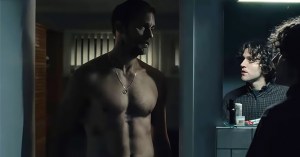Tom Payne Trades The Walking Dead Zombies for Serial Killers in Prodigal Son
Fox makes a play for murder-obsessed TV fans with a dark new crime drama led by Payne and Michael Sheen.
Malcolm Bright just needs a hug.
“It’s what the world needs now,” Tom Payne joked when Rotten Tomatoes spoke to the man formerly known as Jesus on The Walking Dead about his new role on Fox serial killer drama Prodigal Son.
Payne plays Bright, a former FBI profiler fired for his unorthodox methods; namely, consulting with his dad, Dr. Martin Whitly, a notorious serial killer known as The Surgeon (and played by Good Omens‘ Michael Sheen). The show picks up as Bright begins a new gig as a consultant on murder cases for the NYPD.
“I spend a lot of my time when the cameras are rolling in different emotional states. I’m either incredibly upset, or I’m angry, or I’m high on some substance or other. It’s a very extreme role,” Payne said.

(Photo by Mark Seliger/FOX)
“The psychology of the character is very extreme,” he continued, “and I find, actually with the scenes with Michael, that they’re exhausting because there’s so much going on under the surface. Because at the heart of it, he just wants a hug from his dad. But, at the same time, he can’t go there because who his dad has turned out to be. So, those scenes are really, really tiring actually. So if there weren’t nice people to talk to you off set, then I might go a little bit stir crazy.”
Below, the actor discusses the psychology of serial killers, cases of the week, and transitioning from a zombie apocalypse to murder most foul.
Jean Bentley for Rotten Tomatoes: In the first few episodes, your character is the hardest to get a read on because he’s been so affected by what his dad did.
Tom Payne: Actually at the beginning, certainly when we shot the pilot, that was the biggest task for me: Where is the center of this character? What is it? And obviously because we were doing the pilot as well, we were throwing a lot of ideas around — a lot of things which didn’t end up in the show in the end. It took me a while to settle into it, and even watching it now, he’s a difficult character to pin down. But that’s because there is so much going on and he’s a bit of a wild card at the moment. He has different relationships with everyone.
I think in the time that he was away from New York, he established a certain way of behaving and being, but in coming back to New York and reconnecting with his father, it’s really lit a few different fuses inside of him, and he’s a lot more wayward again, and he doesn’t know who he’s going to be from one moment to the next. And that’s quite difficult to play because you want to have precision about what you’re doing. But, at the same time, I kind of have to play it moment to moment, really. You have to push the boundaries of who the character is because it is extreme. And at the end of the day, it’s also entertainment. So it’s entertaining to watch a character who you don’t know what’s going to happen next.
In the pilot we were talking about characters like Riggs in Lethal Weapon, who is just unpredictable and scary at the same time, and you don’t know what’s going to happen. I enjoyed that side of it. He should be unpredictable, but also, at the same time, you want to give him a hug, really, and make sure he’s OK.
This guy just needs so many hugs.
Basically.

This is a darker drama for network TV, and it also plays into pop culture’s current obsession with true crime. Would you agree?
Payne: There’s a lot of deep, dark psychology involved in this show. And actually, for me, even, it raised this question that I hadn’t even thought about, which was about the families of the people who commit these crimes. There was a podcast called “Happy Face” that I listened to, which followed the daughter of a serial killer in interviews that she did with relatives of her father’s victims. It really affected me because it’s so emotionally scarring to have a relative who’s done this — and such a close relative.
It’s a dark place to go to, and it’s going to bring up all sorts of questions about your own inclinations and feelings, and how everyone else feels towards you and that which you have no control over. That’s in the center of our story: Malcolm changed his last name and moved away to get away from all those things. And now, he’s come back to New York and dived straight into the middle of all of it again — which is why he’s somewhat wayward in our story right now.
There’s a huge prevalence of those kinds of stories and a lot of interest in that. And in the show, we try and get into the real family psychology of the situations, and how everyone else is affected by one person’s actions.
What was it like going from The Walking Dead to this? They’re both heavy shows.
Payne: In The Walking Dead, they’re obviously not real — zombies don’t exist in the real world and it’s not something that happens. So there is still a fantasy aspect in that. In Prodigal Son, that stuff happens, and there are people who are related to serial killers and there are serial killers. So actually, this show was a bit more disturbing to delve into and to get involved with.
It’s really heavy. You start to read and do research and get into all of this. And just me, personally, it’s hard to get to the bottom of why people do these things. The character in the show is just much more closely connected to the story than I am. The hardest thing about it is the fact that he’s related to the serial killer. He has this job where he investigates serial killers, but it’s much deeper than that because it raises questions about human nature, and the character himself, and what triggered his father — at what age did he start doing these things? — and if it could possibly happen to him or his sister.

(Photo by David Giesbrecht/FOX)
Twist for season 2! There’s also a procedural aspect to the show. What can you say about the cases they’re solving on a week-to-week basis?
Payne: As far as Malcolm’s concerned, he’s excited because he’s always intrigued, and he wants to understand and get to the bottom of why these people do the things that they do. Each serial killer is a new adventure for him really and each crime scene is another puzzle to solve.
And then it comes back to him having a deeper understanding of the whole world of killers and their motivations, and it’s another box to tick, really, for himself and his own brain. He can say, Well, I don’t have that inclination, so I can tick that off the list. That’s not me. But there are aspects of each case which provide a deeper understanding of his own psychology and what might may have triggered his dad. Because at the bottom of it, he’s just trying to get to the core of why these people do the things they do.
At the end of the day he just wants a hug from his dad and he wants to be able to understand him, so that in some way, he can forgive him and treat him as a human being and he can connect with that. It’s very difficult to connect with this monster, this vision of his father that everyone else has, because he was too young to really comprehend what was happening when it happened. He has hearsay and stories and books about what his father did. It’s become this much bigger bogeyman.
Do you have a favorite case they’re investigating so far? Episode two has snakes and it was a lot of fun to watch.
Payne: That was super fun. That crime scene was really cool. Each week is a new and exciting killer, which is lots of fun to play with … they’re exciting for the character — it’s nice to play that kind of weird, off-kilter excitement in those scenes.

(Photo by David Giesbrecht/FOX)
Malcolm has a very complicated relationship with his father, but he has a positive relationship with Lou Diamond Phillips’ Det. Gil Arroyo, his mentor and father figure and now supervisor at the NYPD. He also has his mother, Jessica (Bellamy Young). What’s it like for Malcolm to have those conflicting parental role models?
Payne: He’s an example of how you would think a father should be, and he’s very protective of [Malcolm] and his psychological well-being. That’s a nice comfort zone for Malcolm to have, because he has a relationship certainly with his mother and now his father, but they’re both distant in different ways. His mother and that relationship develops as the show goes on.
They’re not huggers in that family. I come from England, which can be a lot like that as well, so you might want to have that emotional conversation with your parents, but it’s never quite going to happen in the way that you would like it to. So the relationships for Malcolm are quite emotionally strained. For his relationship with Lou and Michael’s characters, it’s difficult because Lou is there and is providing all of this warmth and lovingness and protective energy.
But his dad is still around. His actual biological dad is still there, and he remembers him as this wonderful dad. His memories of his father are as this wonderful person, and they went on trips together, and he taught him so many things, and he was great. And then he became this other thing. That’s really what Malcolm’s trying to deal with: He wants that relationship back, but it will never be what it was.
We grow up and realize that our parents are human beings and have made mistakes and done bad things and done great things. It just so happens that in Malcolm’s life, his father has done things which you can never be forgiven for.
Prodigal Son airs Mondays at 9 p.m. on Fox.







